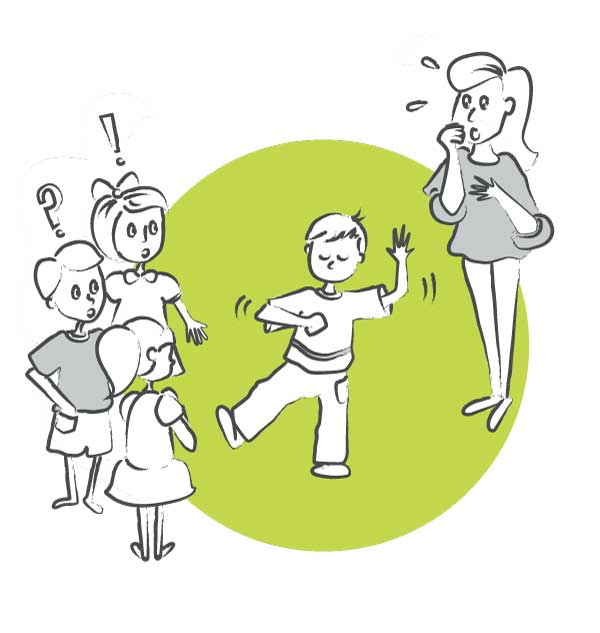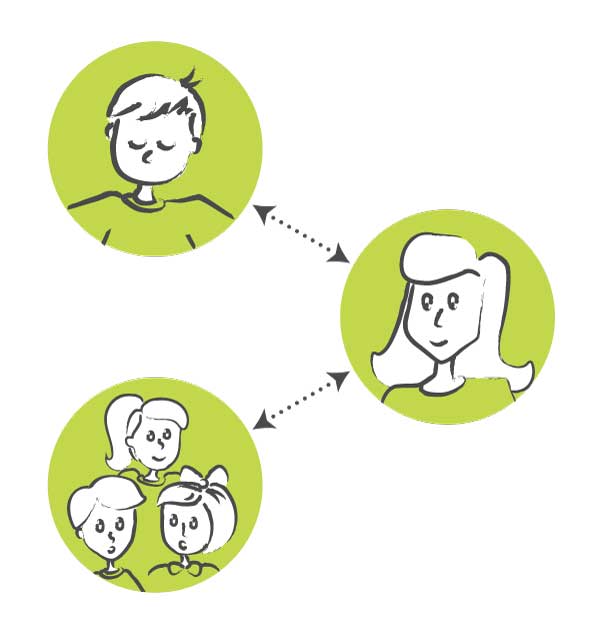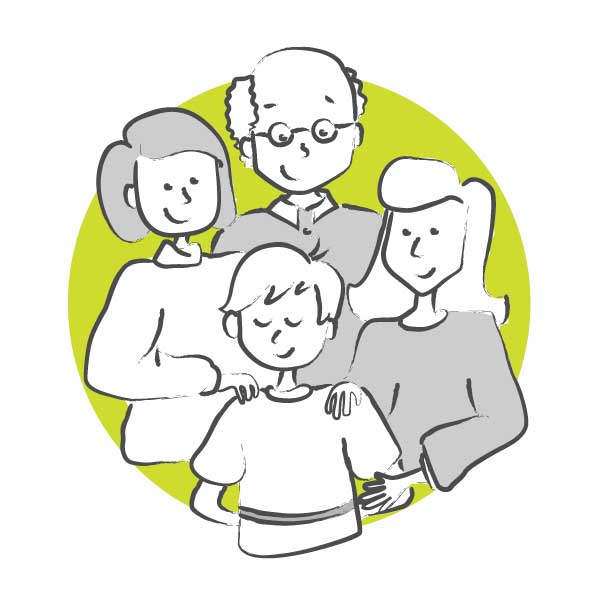
vie-magazine-spectrum-bridge-hero-min
Spectrum Bridge
By Laurette Ryan | Illustrations by Lucy Young
He twirled, flapping his arms at the elbow. Oblivious to all others around him, he whirled like a dervish in the middle of the room. The other children backed away slightly, looking askance. Disapproval, even at that young age, was written all over their faces.
It was his brother’s preschool graduation party, a wonderful event put on by the school, where they rented a hall, got a kid-friendly DJ, and held a potluck dinner for all the children and their families. I already understood he was different. I carried that information with me daily for years. I faced it with determination. I didn’t pray for it not to be true. I only prayed that I could give him the tools to have an amazing life like all parents do. He was smart. Actually, he was genius-level smart: taught-himself-to-read-at-age-two, double-promoted-in-first-grade smart.
As I stood on the edge of that dance floor, the reality of it came rushing at me like a hurricane. I would have broken down right then and there, except being strong is something children need in their parents. If you fall apart, their world falls apart. That is not an option. So, I stood. Then I waded into the crowd, tapped him on the shoulder, and urged him to come with me to get something to eat.
I felt bad. He was enjoying the movement, the music; he was happy in his own little world. But I saw the looks from the children who were confused by a behavior that seemed so disconnected from them. I saw the looks from the other parents who seemed to be thinking that my boy was a disruption, a behavior problem. The looks that discomfit any adult, crushing the confidence in your ability to parent. I imagined they were relieved that I finally took charge of that unruly child flailing about the dance floor and disregarding everyone else’s personal space.

Illustration by Lucy Young
We stayed only a bit longer. It was noisy and chaotic—never a good scene for children on the spectrum. I wanted to look polite. I wanted my other child to enjoy the normalcy of preschool graduation with all the other children. When you are the parent of a child on the spectrum, there are everyday, normal places and events you will leave—or never attend—because it’s just too much. Pushing the limits can lead to meltdowns or other socially embarrassing moments. It’s your job to know and monitor every situation, especially when your child is young.
I gathered my children, put them in their car seats, and began to drive home. I tried not to think about it. I didn’t want to dive into my feelings. I could feel the power of that hurricane coming right at me. I could not get that picture of my son, by himself in the midst of the crowd, flapping and spinning—in the midst of a crowd and all alone.
I started to cry. I reprimanded myself: “Stop. So, it was a little embarrassing. You’ve been embarrassed before—get over it.” My mind answered back with anger. I pictured those disapproving children and parents. “How dare they! They have no idea how he struggles!” I thought.
My heart broke more with every mile between the party and home, but it also responded, “This is not anger or embarrassment: this is fear. This is fear that in a group, he will be alone. People will back away from him in confusion. This is fear for his future, for connections and love and success and acceptance.” I felt like I had a glimpse of his future that evening—a little boy in the center of a world that drifted and moved away from him. It was an image that would frighten any parent.
When your child is on the spectrum, it is your job to be a bridge. A bridge between society (friends, family, the world) and your child.
When your child is on the spectrum, it is your job to be a bridge. A bridge between society (friends, family, the world) and your child. You are explaining daily to your child how society works, what is socially expected and appropriate. Sometimes you have to repeatedly explain norms to the point that you start to question yourself, especially when you start to elaborate the “why?” There are always whys, and if the answers don’t make sense, the whys don’t stop until you put your foot down and say, “Because that’s just how it is!” Your child may stop asking why, but they never really accept an illogical answer.
You also spend your days explaining to others that your child’s behavior is normal for someone whose sensory tolerance is so low that even the sound of running water in a sink is like the deafening sound of Niagara Falls. And if they can’t turn down the volume, your child will melt down due to no fault of their own. You are constantly trying to explain that your child is not this way because of bad manners or lack of discipline. These can be hard discussions. My child does not need your approval, but, on a certain level, I do.
Being a bridge is difficult work.
Although I have never prayed that my child would not be on the spectrum, I have prayed that life would be fair to him. That society would have patience and understanding for him. That the stigma of ASD (autism spectrum disorder), Asperger’s syndrome, autism, and PDD-NOS (pervasive developmental disorder not otherwise specified) would disappear. Through education, society would embrace my child and value him for his intelligence and gentle soul.
Being on the autism spectrum is hard. Being the parent of a child on the spectrum takes strength and stamina. There is no handbook or manual to read that adequately enlightens anyone to be a parent.
Being on the autism spectrum is hard. Being the parent of a child on the spectrum takes strength and stamina. There is no handbook or manual to read that adequately enlightens anyone to be a parent. Truly there is no handbook on parenting a child on the spectrum. You learn day by day, tear by tear—and also smile by smile. There will be smiles. There will be victories. Expectations and priorities will change.

Illustration by Lucy Young
The days of parenting a small child on the spectrum are the most challenging. They will grow you as a human being. They will test you to your core and strip away superfluous values. Having a child on the spectrum is a blessing I would never change.
My child is a young man now, so the challenges are different. As a parent, letting go of what others think has been the greatest lesson. We can only do our best each day.
He said this: “Walt Disney said, ‘I think it’s important to have a good hard failure when you’re young. I learned a lot out of that,’ and so I would like the opportunity to fall on my own.”
When my son was seventeen, he did a video for his IEP (individualized education program) team at school. He was asked in the interview what he would like the team to know about him and his desires. He said this: “Walt Disney said, ‘I think it’s important to have a good hard failure when you’re young. I learned a lot out of that,’ and so I would like the opportunity to fall on my own.”
The opportunity to fall on their own—so hard for any parent to allow. I have learned to let him fall and was always sure to be there to encourage him to get back up.
And so I will forever be standing on the edge of that dance floor, watching and hoping for a world that can cross the bridge to understanding that many challenges of persons on the spectrum are invisible but very real.
— V —
Laurette Ryan is a professional in the health and wellness industry and has been a national fitness presenter for over thirty years. She is the author of four books on fitness, self-improvement, and life coaching and the mother of four amazing children, two of whom are on the autism spectrum. They reside in Massachusetts.
Five Things Autism Parents Want You to Know
By Susan Vallee
Autism officially entered our family’s life nine years ago. It crept in slowly, beginning with stomach upset and then evolving into sleep issues. While we panicked and dealt with one illness after another, this intruder stole the bright happiness from our son’s eyes.
We didn’t know how to help him or what to do next. We received zero encouragement from doctors and no suggestions on ways to help.
I funneled my anger and frustration into an ever-constant path of research. Through the exhaustion, my husband and I agreed to do everything we could to help our son come back to us.
We started reading everything we could about autism and quickly realized we needed to become his advocate because there was no support system in place for parents who viewed autism as a medical condition. As we spiraled into the world of healing our son, we shifted our focus and began to view life through a different prism. Nothing was the same.
There is so much you can do to help your child, but it’s not an easy path, and it can be isolating at times. So when I was asked by VIE to pen an article about what I’d like people to know about families with children on the spectrum, it was hard to boil it down to a few things. I finally settled on five main topics that I hear again and again at autism conferences and with friends who have children on the spectrum.

Illustration by Lucy Young
1. Don’t ignore our kids.
If my son is walking around the room in circles and not looking you in the eye, he still hears you. If you have a question, ask him (not me). If you’re working in a restaurant and he makes an effort to look you in the eye and order, respect that. Don’t look at me and question everything he says. And if he asks you a question, answer him directly.
This also applies to birthday invitations and other get-togethers. Autism parents understand that you may assume a night at the arcade would be too much for our kids, but please ask anyway. Our kids might be fine with it. If they aren’t, it still feels wonderful to be invited. Make an effort to include them. They are kids, after all.
2. We need support.
I can’t begin to tell you how many autism families I speak with who have had their families turn their backs on their kids. Parents are exhausted and overwhelmed and need support. Often the grandparents seemed frustrated and angered when told they can’t do certain things with their autistic grandkids. Not being able to eat certain foods is not an insult to a grandparent’s cooking skills or nutritional decisions—it’s often a health issue for the child. Food allergies and issues with food dyes and additives are common in kids on the spectrum. Food coloring, for example, is a proven excitotoxin. Some kids can eat foods with dye and are perfectly fine; others have behavior issues or upset stomachs. It might seem like a harmless thing to give them a treat, but the aftermath isn’t worth it.
Aunts and uncles sometimes get put off that our kids can’t talk on the phone or can’t just go anywhere to grab dinner. Some restaurants are loud and frightening to kids with sensory issues. Others have strong odors that are offensive, or they don’t offer allergy-friendly options.
Please don’t judge our parenting based on how you parented your neurotypical child.
Everything we do as spectrum parents requires planning. There’s not a lot of spontaneity when you have a child with anxiety and sensory issues. Please don’t judge our parenting based on how you parented your neurotypical child. It’s not the same—not even close. It’s okay that you don’t understand; we don’t expect you to. But we do expect you to be a shoulder to cry on occasionally, or an ear to complain to, or even a once-in-awhile babysitter.
3. We need patience.
We probably aren’t going to be on time—a lot of the time. This isn’t a planning issue or disrespect. For many, it’s an anxiety issue for their child. Some parents can be ready to leave for school and then their child, who seemed excited just minutes before, is suddenly having a meltdown about leaving the house. Because every child is different, these meltdowns differ. Some kids simply refuse but can be coaxed out of the house; others will take off their shoes, throw things, and run around the house yelling. At a recent autism conference, I spoke with several parents whose children will bolt from the house in sheer panic when their anxiety bubbles to the top.
Parents are probably sleep deprived, too. We’re trying to juggle a schedule of supplements and therapy appointments, plan out semipredictable days, deal with homework and school, and do all the other things that come with parenting on a daily basis. Chances are we’re not going to make sense at some point.
4. We need love.
We need love. We, the autism parents, need love. Our kids do also (of course!), but in the course of caregiving, parents are neglecting themselves. We’re not taking time for ourselves. We’re not getting adequate sleep. We’re missing our annual doctor visits because we’re too consumed with doctor visits for our children.
We’ve had friends drop out of our lives because they no longer feel they can relate to us. Maybe they can’t, but it still hurts.
I recently met a woman who was distraught that she no longer felt welcome at her church. When I asked why, she said it was because the nursery staff could not handle her toddler. They had asked her to keep him with her, but when she tried that, he was disruptive to the church service. She cried and asked why every little thing is a struggle. “Why can’t we get up and go to church like everyone else?” she asked.
Autism parents don’t expect everyone to be a licensed child therapist or an expert in special needs, but is it too much to ask for a little compassion?
We’ve had friends drop out of our lives because they no longer feel they can relate to us. Maybe they can’t, but it still hurts.
5. We need financial help.
We are broke. All of us—well, maybe there are a few who aren’t, but they are rare. I was recently at the National Autism Conference and watched about 150 heads nod in agreement as a respected doctor, employed at a respected hospital, complained about living paycheck to paycheck because of costs associated with autism. Sure, we have insurance, but occupational and speech therapy isn’t covered to the level most need (typically fifteen to twenty hours per week).
Years ago, when we first began applied behavioral analysis (ABA) therapy, we were told forty hours per week would be needed to truly help our son. Each hour-and-a-half session cost us $150 (and we had health insurance). I’ll let you do the math.
Insurance doesn’t cover vitamin supplements, and there are many children on the spectrum who have vitamin deficiencies that need supplementing. This can total about $150–$200 per month, and that’s just the basics. EEGs, tests for gut health and stomach issues, genetic testing, and allergy testing are becoming basic approaches to newly diagnosed children, and those come with hefty bills attached.

Illustration by Lucy Young
Eating a whole-food, low-inflammation diet is recommended for children with gut issues, and this adds to the expense of the monthly grocery bill. As our children grow up, the need for services and support does not diminish. It’s a constantly evolving schedule of tests, protocols, and therapies. As the research evolves, so does the approach that parents might want to take.
And with all this monitoring and caregiving, working full-time can be difficult. Finding appropriate childcare becomes even more difficult and expensive.
In our nine years on this journey, we’ve cheered every single gain that our son has made. He’s come back to us in a hundred different ways. Every moment of struggle or frustration has been worth it. Our hopes and wishes for him continue to expand, and we just adore him. Nothing in my life has made me happier than being a mom.
Nothing in my life has made me happier than being a mom.
If you have a relative or a friend with a child on the spectrum, please treat them with compassion and love. Yes, our lives are different from yours—but they’re no less wonderful in their own exhausting way. Spectrum parents see magic in the smallest moments. Let us share those with you. Get down on the floor with our kids and make an effort to engage them. Your life (and theirs) will be so much richer for the effort. Please remember this slogan: Different, not less.
— V —
Learn more and see how you can help improve the lives of people with autism and their families when you visit websites such as Autism-Society.org, NationalAutismAssociation.org, MyAutism.org, and AutismSpeaks.org.
Susan Vallee is a mom to two terrific boys (one happens to be on the spectrum). She is the publisher of a family magazine, 30A Kids Club, and her nonfiction and personal essays have appeared in national publications. She also writes fiction and is currently working on her first book.
Share This Story!
KEEP UP WITH THE LATEST STORIES FROM VIE
















































































































































